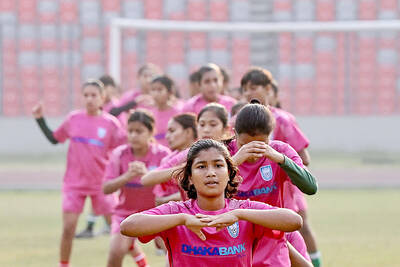The man who pioneered Kenya's dominance in the 3,000m steeplechase has fallen on hard times.
Amos Biwott, now 55, is so poor he sometimes cannot afford the 100-shilling (US$1.20) bus fare to watch athletics meetings in the nearby town of Eldoret, the capital of Kenyan distance running.
Biwott's 3,000m steeplechase gold medal in Mexico City in 1968 was Kenya's first Olympic title over the distance. Kenyan athletes have won the event in all subsequent Olympic Games.
Now, he wonders whether the glory he and the athletes of his generation brought their country was worth the struggle.
"Maybe only God can help us out of this miserable life because the government, it appears, is not able to help," Biwott said in his home near Eldoret some 350km northwest of the capital Nairobi.
"We really struggled for this country. We were not being paid allowances. All we got was two weeks' leave from our place of work and then life would continue.
"There were no incentives. Very few of us, maybe two or three, were given land by the government but that was all."
Financial concerns have spurred several modern-day Kenyan athletes into moving abroad.
Among them is world 3,000m steeplechase champion Stephen Cherono who has defected to Qatar and adopted the new name of Saif Saeed Shaheen in return for better training facilities and the promise of US$1,000 a month for life.
Kenya's government says it is working on plans to help retired athletes, but has yet to provide details.
"The Minister [for sport] Najib Balala made it clear late last year that a special fund will soon be set up for the welfare of retired athletes who brought this country glory. The logistics are being worked out," the government's deputy commissioner for sport Gordon Oluoch said.
For Biwott, such words provide little comfort. He says he does not know where his next meal will come from. Friends helped him to build the house he lives in some 20km south of Eldoret.
Like many other veteran runners, he argues that the government should use ex-Olympians as a resource for the current generation of sportsmen and women, giving them a monthly stipend in return for advice on athletics.
"Something like a monthly payment of a modest figure can be arranged for us," Biwott said.
"If that is not possible, our children can be employed in the civil service to assist us."
A government income would have been especially useful in the three years of joblessness Biwott has suffered since being dismissed from his last job as a watchman at a sports center.
"The government should buy us tickets to attend this year's Olympics in Athens, but more important is for the government to find a solution to the abject poverty athletes who brought it glory are left to endure," said Biwott, bitterness and hunger etched on his face.
Some say Biwott has done himself no favors. He spent a year in jail after committing a theft and lost his job because of what his bosses described as absconding from duty.
But his defenders say his mistakes do not erase the prestige his medal brought Kenya.
Born in September 1948 in Nandi, Biwott was 20 years old and still attending Lelmokwo Secondary School when he and compatriot Benjamin Kogo won Olympic gold and silver respectively in Mexico.
Naftali Temu, who died a year ago, won Kenya's first Olympic gold in the 10,000m at the same Olympics.
Kip Keino won the 1,500m gold medal, giving the east African nation a medals haul surpassed only by their performance at the 1988 Seoul Games when they won four golds on the track alone.
Biwott joined the Kenya Prisons Service in 1973, in part thanks to the goodwill he earned through his Olympic medal.
He rose through the ranks until his ignominious departure in 1978 when he was prosecuted for theft.
Biwott remained unemployed until 1986 when he landed a job as a watchman at the newly built stadium but he was dismissed three years ago and has remained at home since.
His wife Cherono Maiyo was among the first Kenyan female Olympians. She took part in the 1972 Olympics in Munich and reached the semifinals in both the 800m and 1500m.
Maiyo married Biwott in 1973 and they have five children aged between 28 and 14.
On the wall of their living room hang three items which are the only signs that Biwott was ever involved in athletics.
One is an award which Athletics Kenya gave to all former Olympic and Commonwealth Games medalists. Alongside it are a team portrait from the 1970 Commonwealth Games and a certificate awarded to Biwott for participating as a volunteer in the 1987 All African Games in Nairobi.

Fenerbahce on Thursday earned a rare 2-1 win in England, but were still knocked out of the UEFA Europa League by Nottingham Forest in the playoffs. Forest entered the second leg with a healthy 3-0 lead from the opener in Istanbul — where Vitor Pereira made an impact in his first game in charge — and that proved enough to advance to the round-of-16 with a 4-2 aggregate score. The result was a boost for Forest, struggling at 17th place in the Premier League, in their return to Europe after three decades. They next face Real Betis Balompie or Kerem Akturkoglu gave Fenerbahce

Soccer officials yesterday offered “full support and assistance” to the Iranian team in Australia for the AFC Women’s Asian Cup after the US and Israel launched massive attacks on their homeland. Iran’s 26-strong squad arrived on the Gold Coast days before the strikes on Saturday killed supreme leader Ayatollah Ali Khamenei, as Washington and Tel Aviv seek to topple the Islamic republic. They are due to open their tournament today against South Korea. The AFC in a statement said it “continues to closely monitor the recent developments in the Middle East during this challenging period.” “The AFC’s foremost priority remains the welfare, safety and

ROAD RASH: Marc Marquez retired after a crash, marking the first time after 88 consecutive races stretching back to 2021 that a Ducati bike failed to make the podium Marco Bezzecchi yesterday won the MotoGP season-opening grand prix in Thailand from pole position as defending world champion Marc Marquez retired late with a buckled wheel. Aprilia’s Bezzecchi led from start to finish to top the podium in Buriram, with KTM’s Pedro Acosta second and Trackhouse’s Raul Fernandez third. Ducati’s Marquez is chasing a record-equaling eighth world title this season, but he exited the race in dramatic fashion while in fourth place with five laps to go. The Spaniard, who started from second on the grid, took a corner wide, with the jolt to his bike dislodging the rear tire, badly damaging his

EVERY DAY A VICTORY: Players on the women’s team faced pressure from society just getting out onto the field as they prepare for their first Women’s Asian Cup game today Bangladesh’s national soccer team face daunting odds at their first-ever Women’s Asian Cup, but have already scored a major victory by qualifying. In the South Asian nation of 170 million, social stigma, family expectations, poverty and religious hardliners have long relegated women and girls to sports sidelines. The first women’s soccer league matches took place in 2011 and the squad, known to fans as the Red and Green, have kept pressing forward despite deeply embedded prejudices. “Many more girls would have joined us if the community had been even slightly supportive,” captain Afeida Khandaker told AFP ahead of her side’s March 3